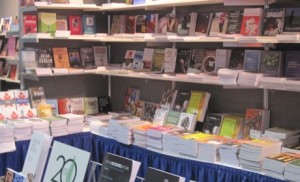Bibliomania 1812 and Expo 2012

Maria Dubecki
Congress 2012 Correspondent
With the official opening of Expo 2012 and Deidre Lynch’s presentation “Bibliomania and Bibliophobia in 1812†occurring on the same day, the consideration of historical and present day book collecting met at a crossroads.
Lynch’s presentation, organized by the Association of Canadian College and University Teachers of English, discussed the early nineteenth-century practice of book collecting. As Lynch explained, this practice saw collectors as bibliomaniacs who valued the book matter, the literal material of the book, over the book meaning. Lynch’s presentation mixed history and humour through her analysis of key moments in nineteenth-century Britain such as the “other†war of 1812: the bidding war on the Duke of Roxburghe’s personal book collection.
Lynch also touched on the ways that early nineteenth-century bibliomania connects to the present day passions of book lovers. In converging concerns from 200 years ago with today’s polarized material versus electronic book culture, Lynch revealed – to my own and I think most of her listeners’ comfort – that in 1832 some thought the death of the book was already looming and that booksellers’ days were numbered.
Knowing that I would be exploring the Expo and listening to Lynch’s talk on the same day, I was already considering the changing nature of book collecting. With the emerging popularity of e-books, present day bibliomaniacs (those who adore the materiality of their books) might be concerned with what book collecting means in the coming years.
Taking advantage of the Expo’s opening and the convergence of such a vast range of publishers, I set to the Laurier Athletics Complex to gather opinions on book collecting in material versus electronic forms from the representatives of three publishing houses.
I first spoke with Christine Handley and Julia Tignanelli from Broadview Press. When asked about the meaning of a physical book versus an electronic one both women felt that in certain circumstances, for convenience or light reading, electronic books are suitable. However, Handley elaborated that, for her, electronic books lack important qualities because “a book is a tangible, historical object.†Tignanelli added that a material book is “also a static thing that you can pass on from generation to generation…my e-reader I can’t pass on to somebody.â€
Next, I spoke with Leigh Nash from Coach House Books, a publishing house that still makes all their books in house by hand and offers e-reader versions too. Nash explained, “I think people still like to have things on their shelf to show off to friends… They’re definitely still a status symbol, which is kind of interesting if you look at it from the e-book perspective because not everybody can read an e-book since you need to have a device. With a book you can generally still walk into a library and get it.â€
My final interview was with Kitty Lewis, the General Manager of Brick Books, who offered, “The physical book is not dead. We’re just giving it another way to be read in the e-book form. But people want to read, so no matter which way they want to do it is good for us.â€
Thus, in a single day at Congress 2012 I found myself considering early nineteenth-century book collecting alongside varied present day practices. At these crossroads one conclusion seemed evident: the nature of books has been and will continue to be uncertain; but this uncertainty does not dismiss, it perhaps enforces, the important meanings conveyed by and in books.





